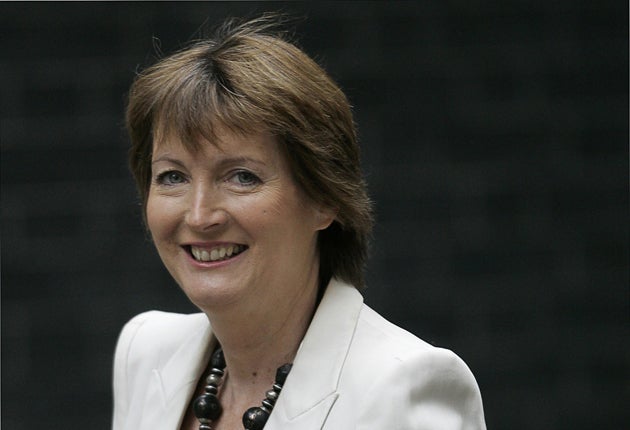Brilliant new women are Labour's USP
Joan Smith salutes Harriet Harman for wrongfooting the PM

Your support helps us to tell the story
From reproductive rights to climate change to Big Tech, The Independent is on the ground when the story is developing. Whether it's investigating the financials of Elon Musk's pro-Trump PAC or producing our latest documentary, 'The A Word', which shines a light on the American women fighting for reproductive rights, we know how important it is to parse out the facts from the messaging.
At such a critical moment in US history, we need reporters on the ground. Your donation allows us to keep sending journalists to speak to both sides of the story.
The Independent is trusted by Americans across the entire political spectrum. And unlike many other quality news outlets, we choose not to lock Americans out of our reporting and analysis with paywalls. We believe quality journalism should be available to everyone, paid for by those who can afford it.
Your support makes all the difference.Here's a surprise result from the first match of the Westminster season – Cameron 0: Harman 1.
During his debut on the government side of the House last week for Prime Minister's Questions, David Cameron was forced to retreat from a stale old proposal to extend anonymity to defendants in rape cases. The acting Labour leader, Harriet Harman, pointed out that the move would make it more difficult to bring rapists to justice, and the Prime Minister immediately started to backtrack. He conceded that publicity in rape trials performs the vital function of encouraging other victims to come forward, and came up with a watered-down proposal that would provide anonymity only between arrest and charge.
I wonder if someone reminded the Prime Minister, in the period between the Tories' blithe announcement of a pet Lib Dem proposal and his first appearance at the despatch box, about the case of the black-cab rapist. John Worboys attacked women across London with impunity for years, and when he was finally charged, an astonishing 85 further victims came forward. Rapists are often serial offenders, and a woman too traumatised to go to the police on her own behalf may change her mind when she discovers that other women have been assaulted.
Labour women are not going to let this one go: the former Europe minister, Caroline Flint, has secured an adjournment debate on the proposal in the House tomorrow night. Now the Tories, who flirted with exactly the same idea back in 2003 – Dominic Grieve, now Attorney General, acknowledged the arguments against it and withdrew support for a crossbench amendment – are in the awkward position of having to defend a compromise that will satisfy no one. That's the trouble with listening to their Lib Dem partners, whose ideas on sexuality have barely progressed since the Seventies – I won't say anything here about David Laws – and a consequence of the shamefully low number of women in influential positions in either party.
Challenging Cameron on anonymity for rape defendants wasn't an obvious tactic for Labour at PMQ last week, but it paid off. Harman knows this subject inside out and she also knows how much it matters to women up and down the country. The pressing problem isn't a tsunami of false rape allegations; it's what Grieve once described as the "abnormally low conviction rate". If the Tories and the Lib Dems are really going to ignore this genuine scandal in favour of worrying about rapists' rights, they can expect opposition every step of the way from the only party with a substantial female presence – 81 female MPs, more than those in all the other parties added together – in the House of Commons.
At Westminster, Labour's fight-back is being led by women. Last year, Harman said that Labour shouldn't go back to having men in both the party's top positions, and last week she called for a rule change to ensure a 50-50 split between men and women in the Shadow Cabinet. She got the support of Ed Miliband, one of the candidates for the Labour leadership – I wish there was a credible female candidate in that contest – and it's a proposal that would change the face of British politics.
Twenty years ago, when John Major failed to appoint a single woman to his first cabinet, there were only muted protests. Now the coalition's failure to represent fairly half the population is being debated in top-selling women's magazines such as Grazia. Day after day, the TV cameras are exposing the smug boys' club – pale and male, as someone described them – on the government benches. They must be terrified that Labour's women – Harman, Flint, Rushanara Ali, Mary Creagh, Chinyelu Onwurah and the rest – are about to emerge as Labour's USP.
Join our commenting forum
Join thought-provoking conversations, follow other Independent readers and see their replies
Comments